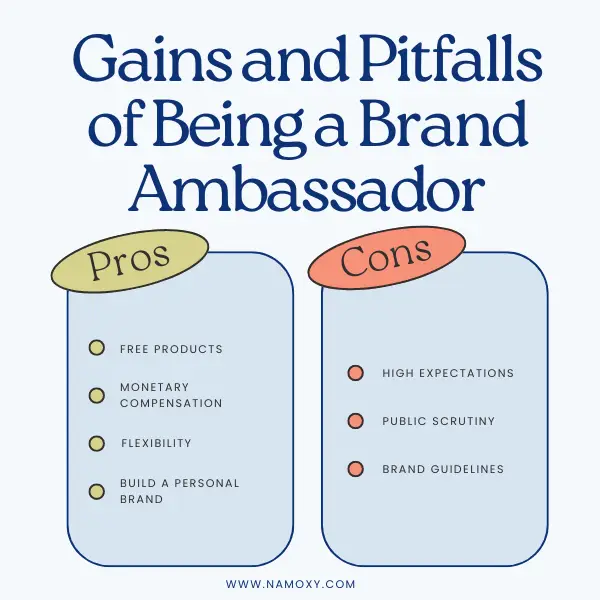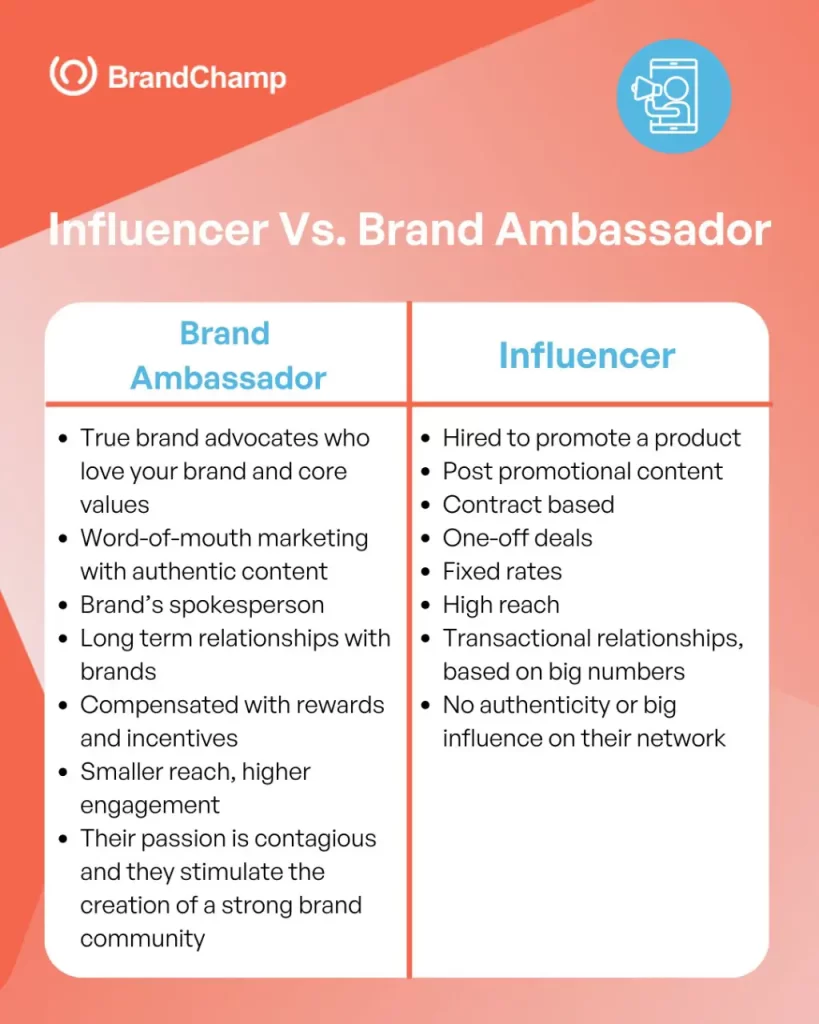In today’s competitive world, brands need more than just traditional advertising to stand out.
They need real people who can connect with their audience on a personal level, this is where brand ambassadors come in.

Whether you’ve seen someone promoting products on social media or representing a company at an event, brand ambassadors play a crucial role in shaping how we perceive and engage with brands.
But what exactly does it mean to be a brand ambassador, and what does the job entail?
What is a Brand Ambassador?
A brand ambassador is a person who promotes a brand in a positive light, helping to increase brand awareness and customer loyalty. If you’re looking to establish your own brand and grow awareness, check out our guide on How to Launch a Brand for a step-by-step approach to creating a strong brand identity.
They represent a company’s identity, ethics, and values while engaging with the target audience through various channels like social media, events, or word of mouth.
Unlike traditional advertising, brand ambassadorship feels more personal, and it’s why brands are investing heavily in it. As consumers, we tend to trust recommendations from real people over corporate marketing messages, and this is the value brand ambassadors bring.
What Does a Brand Ambassador Do?
Brand ambassadors wear many hats, depending on the company and the product or service they represent.
Some common responsibilities include:
Creating Content:
Ambassadors often create content around the brand, such as Instagram posts, TikTok videos, blogs, or even YouTube tutorials.
They showcase how the brand’s products fit into their lifestyle, making the endorsement feel more genuine.
Engaging With Followers:
An essential part of being a brand ambassador is interacting with followers.
This might mean answering questions, commenting on posts, or sparking conversations about the brand.
Attending Events:
Some brand ambassadors represent companies at trade shows, conferences, or product launches.
They might speak on behalf of the brand, share product samples, or just help engage potential customers in person.
Sharing Honest Feedback:
Ambassadors offer brands a unique advantage by providing direct feedback from their followers or personal experience.
This feedback is valuable for brands looking to improve their products or marketing strategies.
Promoting Special Offers:
Brand ambassadors might have exclusive discount codes or special offers for their followers, helping drive sales for the brand.

By doing all these tasks, brand ambassadors become vital to how the brand is perceived by the public.
Pros and Cons of Being a Brand Ambassador
While being a brand ambassador has many benefits, there are also a few drawbacks. Let’s explore both sides.
Pros:
Free Products:
One of the perks of being an ambassador is receiving free products. Many companies will send their newest launches or best-sellers for you to try out and promote.
Monetary Compensation:
In addition to free products, many ambassadors get paid for their services. This can come in the form of a salary, commission, or a per-post payment.
Flexibility:
Ambassadorship often offers flexibility in terms of hours and location. You can promote the brand from anywhere, whether you’re attending events in person or posting online.
Build a Personal Brand:
As a brand ambassador, you’re also growing your own personal brand. The more successful you are in representing brands, the more likely you’ll gain recognition within your industry. If you’re interested in learning how to secure partnerships and build connections with top companies, check out our guide on How to Get Partnerships with Brands.
Cons:
High Expectations:
Being a brand ambassador means constant engagement. Brands expect you to promote consistently, and this can feel overwhelming if you’re managing multiple ambassadorships or have other commitments.
Public Scrutiny:
With a growing audience comes scrutiny. Followers might question your authenticity if they believe you’re promoting a product just for a paycheck, which can affect your personal brand.
Brand Guidelines:
Some brands have strict rules about what you can or cannot say, post, or promote. This can limit your creativity and how genuine your endorsements feel.

How Much Do
Brand Ambassadors Earn?
The earnings of a brand ambassador vary significantly based on multiple factors, such as their following, engagement rates, and the brand they’re working with.
For smaller or local brands, ambassadors may be compensated with free products or small stipends ranging from $50 to $500 per month.
Larger brands often offer more generous compensation packages, including regular salaries or per-post payments.
Here’s a rough breakdown of potential earnings of micro-inluencers, mid tier influencers and top tier influencers
Micro-influencers (1,000 – 10,000 followers): $10 – $100 per post.
Mid-tier influencers (10,000 – 50,000 followers): $100 – $500 per post.
Top-tier influencers (100,000+ followers): $1,000+ per post, with opportunities for long-term contracts.
Larger, global brands, like Nike or Coca-Cola, often work with celebrities or athletes who command much higher fees, ranging from tens of thousands to even millions of dollars per year for ambassadorship.
Why Do Big Companies Hire Brand Ambassadors?
Trust & Authenticity: Consumers are more likely to trust a brand if it’s recommended by someone they admire or follow, rather than through traditional ads.
Brand ambassadors bring an element of authenticity that can’t be replicated with standard marketing tactics.
Word-of-Mouth Marketing: When brand ambassadors genuinely love the products they promote, their enthusiasm is contagious. They can spark real conversations and recommendations within their communities.
Targeted Audiences: Many companies hire brand ambassadors who have a specific audience that aligns perfectly with their target market.
For example, a fitness influencer who’s passionate about health is the perfect ambassador for a new line of supplements.
Cost-Effective: While big companies invest a lot in ambassadorship, it’s still a more cost-effective method than running full-scale advertising campaigns. Ambassadors can drive consistent engagement without the high costs of TV ads or billboard campaigns.
If you’re looking to establish your own brand, securing a memorable domain name at Namoxy.com can be the first step toward building trust and authenticity.
Brand Ambassadors vs Influencers:
What’s the Difference?

It’s easy to confuse brand ambassadors with influencers, but there are key differences:
Duration: Brand ambassadors usually have long-term partnerships with a company, while influencers may work on short-term projects or campaigns.
Role: Ambassadors are often seen as a natural extension of the company—they embody the brand’s mission and values. Influencers, on the other hand, might promote a product without deep ties to the brand.
Engagement: While both ambassadors and influencers engage with audiences, ambassadors do so regularly, reinforcing the brand’s image over time. Influencers tend to focus on immediate visibility and short-term engagement.
How to Become a Brand Ambassador?
- Find Your Niche
- Build a Strong Online Presence
- Network and Engage
- Create consistent, High Quality Content
- Reach Out to Brands
- Stay Consistent
Interested in becoming a brand ambassador? Here’s a detailed guide to help you get started:
Find Your Niche: Start by identifying what you’re passionate about. Whether it’s fashion, fitness, or tech, brands prefer ambassadors who have genuine enthusiasm for their products.
Build a Strong Online Presence: Create and grow your social media profiles with valuable content. Brands are always looking for ambassadors with engaged and loyal audiences.
Network and Engage: Connect with brands you love. Engage with their posts, share their content, and show that you’re already invested in what they do.
Create Consistent, High-Quality Content: To stand out, you need to create compelling content that showcases your personality and your ability to influence others.
Reach Out to Brands: Once you’ve built an engaged following, don’t hesitate to reach out to brands you’d like to work with. Many companies have formal brand ambassador programs or might be open to collaboration.
Stay Consistent: Consistency is key. The more reliable and engaged you are, the more attractive you’ll be to potential brands.
Top 10 Brand Ambassadors in the World
The world’s top brand ambassadors are often celebrities, athletes, or social media stars who have built strong relationships with major brands. Some of the most notable ambassadors include:
- David Beckham – Adidas
- Serena Williams – Nike
- Selena Gomez – Coach
- Roger Federer – Rolex
- Beyoncé – Pepsi
- Kim Kardashian – Skims
- Cristiano Ronaldo – Nike
- LeBron James – Nike
- Zendaya – Tommy Hilfiger
- Kendall Jenner – Estée Lauder

These ambassadors aren’t just promoting products, they’re embodying the essence of the brands they represent, helping to build long-term loyalty.
FAQ: How To Become a Brand Ambasador
Yes, you can represent more than one brand as long as they don’t directly compete with each other.
No, even micro-influencers (with fewer than 10,000 followers) can become successful brand ambassadors, especially within niche industries.
It takes time to build your presence, but with consistency and a genuine passion for the brand, it’s an achievable goal.
Yes, many brands look for younger ambassadors, especially in industries like fashion, tech, or gaming.
A strong social media presence, the ability to engage with followers, and a passion for the brand are the most important qualifications.
Absolutely! You don’t need to be a celebrity. As long as you’re passionate and can engage an audience, you can become an ambassador.



